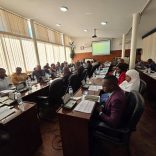Brazil and Mozambique rise in China's infrastructure development index
Economic growth in Mozambique falls by half over 2015 – World Bank

The World Bank predicts economic growth of 3.6 percent this year in Mozambique, half the 6.6 percent recorded in 2015, in a report that points to the poor as the most sacrificed by the crisis that shakes the country.
“The increase in prices has a significant impact on the poorest in the population. Since April, inflation is estimated to have been approximately 9 percent higher for the poorest 40 percent of the population than for the average Mozambican,” according to the report “Mozambique Economic Update – Facing hard Choices”, released this Monday (12 December).
The document says that Mozambique “is going through a complex crisis” marked by an economic recession in turn caused by low commodity prices, natural disasters and armed conflict in the centre and north of the country, and aggravated by the scandal of hidden debts, in April 2016.
“The high level of public indebtedness, coupled with the revelation of US$1.4 billion in previously undisclosed loans, has put Mozambique among the African countries with the highest debt-to-GDP ratios,” the document notes, similarly recalling “successive downgrades by rating agencies, which weakened investor confidence”.
Foreign direct investment and export losses
The document mentions other indicators, including an estimated decline in foreign direct investment and exports in 2016 by 17 and 8 percent respectively and depreciation of 42 percent against the US dollar of the metical in the first ten months of the year, “putting the country in a worse situation than other African exporters of raw materials, including Angola and Nigeria”.

The weakening of the metical, the report continues, had accelerated the pace of inflation to 25 percent by October, “making the rising cost of living the most pronounced symptom of the continuing economic slowdown for Mozambicans”.
While acknowledging that fiscal consolidation and monetary tightening, which have been felt in the second half of the year, “are also contributing to the slowdown in growth”, the World Bank also points to signs that austerity measures are reducing pressures on the external position as imports decline and the metical remains relatively stable since October.
“Key step in rebuilding trust”
The launch of an independent audit of state-owned enterprises benefiting from hidden loans (Ematum, Mozambique Asset Management and Proindicus) is seen as “a fundamental step in rebuilding trust”, but the bank warns of the need for “an approach more focused on medium-term budgetary adjustment to restore fiscal sustainability”.

The report also notes that the mega-projects planned for Mozambique “are showing resilience and may benefit from a short-term boost” associated with the appreciation of raw material prices, and that natural gas production prospects in the north of the country are prompting an expectation that growth will rebound to 6.6 percent by 2018.
Need for reforms
Despite this optimistic note, the World Bank warns that the “broad agenda” of confidence and economic stability “is yet to come” and depends on the outcome of the request for debt restructuring requested by the government and the treatment given to the independent audit.
Other key points on the executive’s agenda, the document points out, are “the definition of a medium-term framework for restoring fiscal sustainability, anchored by a debt reduction goal and a credible fiscal adjustment programme”.
Finally, the report stresses the need for reforms to implement effective supervision of state-owned enterprises and other public entities, along with others to reshape the management framework of the guarantees.












Leave a Reply
Be the First to Comment!
You must be logged in to post a comment.
You must be logged in to post a comment.